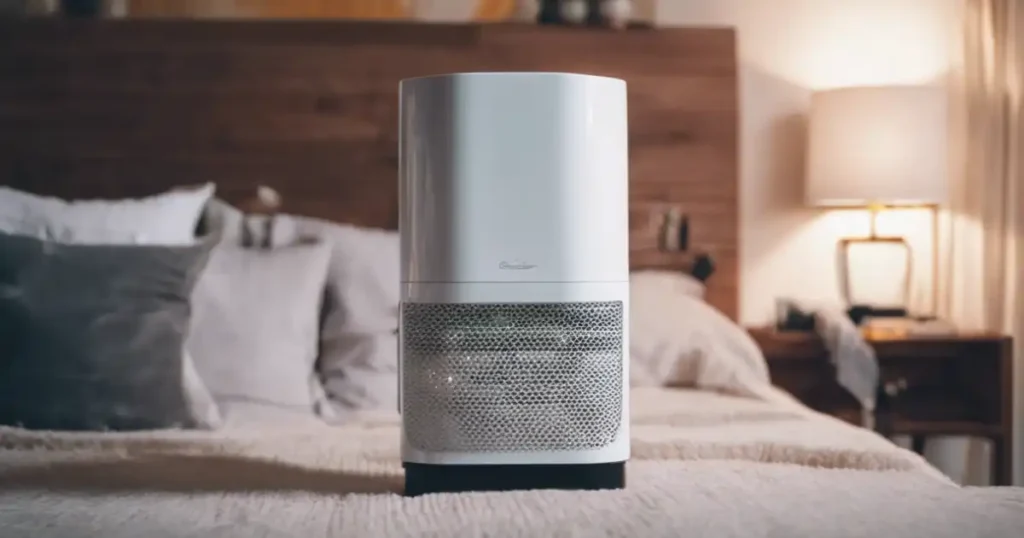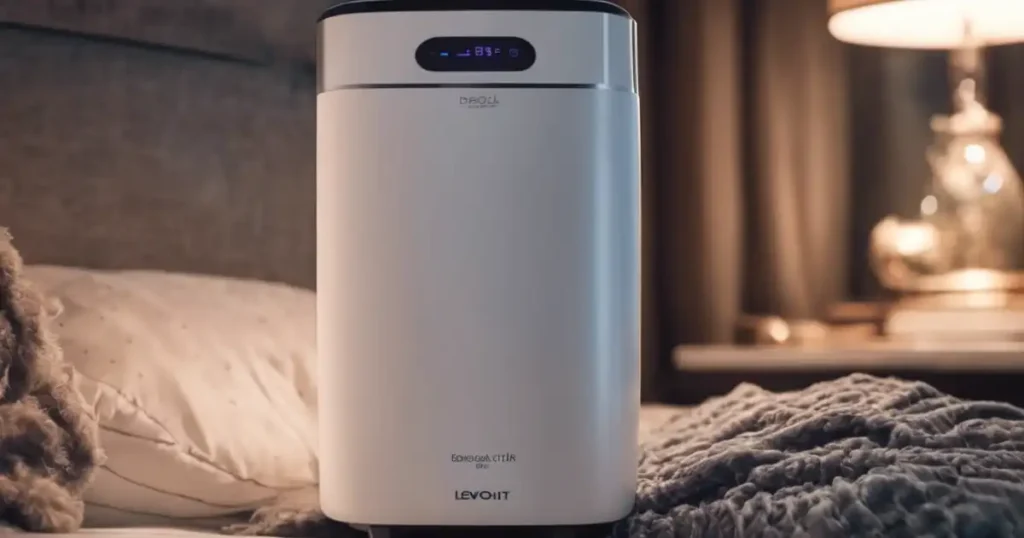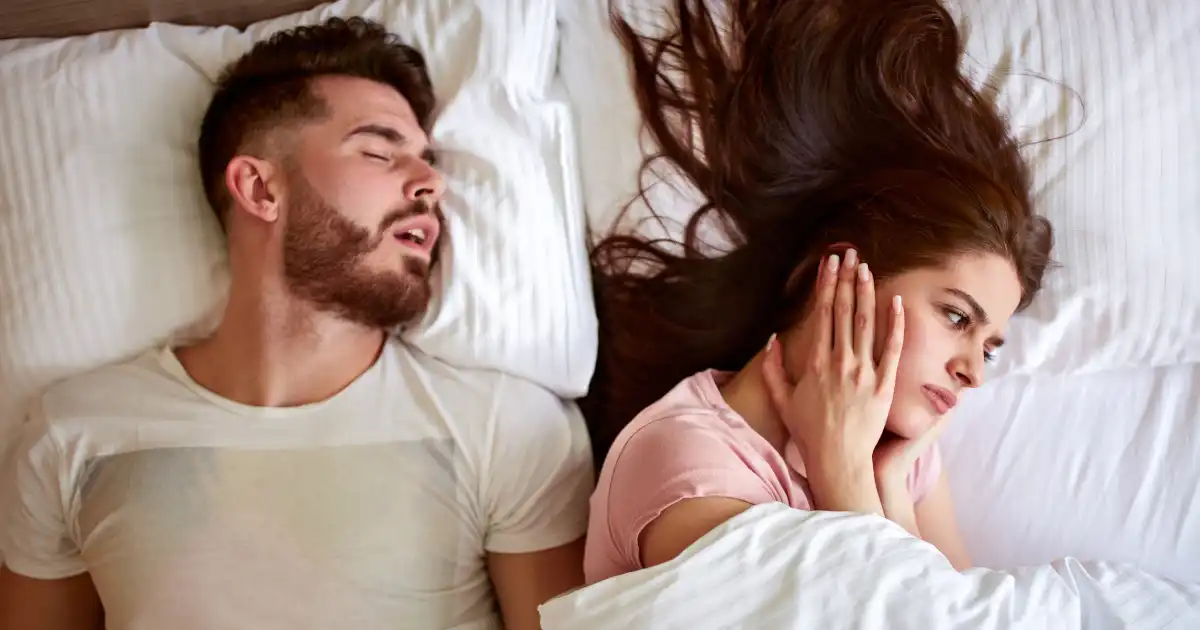Does drifting off to sleep each night leave you or your partner listening to loud, disruptive snores around the bedroom? Or perhaps you wake up feeling tired rather than refreshed, suspecting your snoring is interfering with getting restful sleep. You may be wondering if using an air purifier could help with snoring.
Air purifiers can potentially help with snoring by reducing allergens, dust, and irritants that may contribute to nasal congestion or respiratory issues. Cleaner air may lead to better breathing, potentially alleviating snoring issues.
Curious if a purifier can be the key to a quieter night’s sleep? Keep reading to explore how these devices potentially provide a solution to snoring. We’ll also share practical tips on choosing the right purifier for your needs, ensuring a more restful night’s sleep.
The Link Between Air Quality and Sound Sleep
Before we jump into whether air purifiers can help with snoring, let’s quickly understand the connection between good sleep and air quality. The air in our homes can harbor many allergens, irritants, and pollutants that can interfere with proper breathing and sleeping.
Common indoor air contaminants linked with poor sleep include:
- Dust mites – Microscopic critters and their waste found in most homes
- Mold – Toxins from excess moisture supporting fungal growth
- Pet dander – Tiny skin flakes shed by furry companions
- VOCs – Off-gassing chemicals from paints, cleaners, etc.
- PM2.5 – Microscopic particulate matter less than 2.5 microns small
Exposure to these pollutants affects sleep quality and results in a feeling of unrest the next day.
A study from the National Center for Biotechnology Information (NCBI) highlights that exposure to air pollution, both outdoors and indoors, can negatively affect sleep quality across different age groups.
This research indicates that exposure to pollutants during sleep can lead to irritated airways, inflammation, congestion, and allergic responses. This, in turn, may result in increased snoring due to turbulent airflow affecting nasal tissues and the soft palate, partially obstructing normal breathing.
Do Air Purifiers Help with Snoring?

The answer is yes. Air purifiers improve indoor air quality, which in turn can help reduce snoring.
However, it’s crucial to understand that purifiers are most effective at reducing snoring when it’s caused by allergies or airway irritations.
So, how exactly do they pull off this beneficial effect? Air purifiers work in a few key ways to reduce snoring loudness and improve sleep quality:
– Allergen Reduction
Air purifiers are designed to remove pollutants like dust mites, mold spores, pet dander, and pollen inside bedrooms. Trapping these common allergy triggers prevents them from irritating nasal passages and throat tissues while sleeping.
Removing these allergens cuts back on inflammation and swelling in airways that narrow breathing passages. Opening up airways results in less turbulence and tissue vibration that generates disruptive snoring noises.
– Airborne Particle Filtration
Microscopic particulate matter from sources like auto exhaust, cooking smoke, wildfires, and construction debris can infiltrate indoors. Tiny PM2.5 particles less than 2.5 microns in diameter burrow deep into lung tissues, causing irritation and inflammatory responses.
High-quality purifiers filter out 99.97% of particles this tiny using dense HEPA filters. Stopping these tiny particles before they lodge in airways reduces inflammation that promotes snoring.
– Odor and Chemical Removal
Volatile organic compounds (VOCs) and other household chemicals from cleaners, off-gassing furnishings, and perfumes, accumulate inside homes. These can trigger sensitivities, headaches, and throat irritation for some individuals.
Activated carbon filters in many purifiers adsorb these odors and gasses, preventing them from bothering airways and interrupting sleep.
By leveraging these removal mechanisms, air purifiers create cleaner, healthier indoor breathing air that allows unobstructed respiration. This minimizes loud snoring issues and other sleep-interfering conditions precipitated by common airborne contaminants found inside most bedrooms.
Is It OK to Sleep with an Air Purifier On?
Absolutely. In fact, the best way to gain full anti-snoring benefits is to run an air purifier in your bedroom all night long. This ensures you continually breathe clean, fresh air while sleeping.
Just be sure to choose a quiet model with low decibel ratings. You don’t want a noisy fan disturbing your sleep almost as much as snoring might. Also, make sure purified air output properly circulates throughout your bedroom.
There has been some debate over electromagnetic radiation emissions impacting melatonin production, which signals sleep. However, most modern home-use purifiers emit extremely low to no EMF levels during filtration.
There are some precautions to take for optimal operation:
- Place on the floor at least 3 feet from the bed to prevent immediate particle intake
- Always keep filters up to date for proper functioning
- Select models specifically designed for bedroom use with an emphasis on quiet systems
- Set timers or auto shut-off triggers in case of malfunctions
- Choose appropriate technology for needs like HEPA, carbon filtration, and UV.
Following basic safety steps will allow for clean, healthy airflow throughout the night. Any initial subtle noise should fade into the background, providing the white noise benefit for improved sleep.
Overall, given the snoring and respiratory infection reduction perks, the overnight operation offers profound advantages.
Do Air Purifiers Help with Sleep Apnea?
Sleep apnea is another common and hazardous sleeping disorder where breathing stops and restarts due to airway collapse or blockages. We’ve covered how air purifiers can help reduce snoring, but do they offer any benefits for sleep apnea, too?
For some sufferers, yes, by addressing the same issues related to snoring outlined earlier. Allergens and tiny particles can worsen the problem by irritating your narrow nose and inflamed throat, making it harder to breathe.
When purifiers filter out these irritants from the air, it can make the symptoms better. It helps you breathe easier. However, it’s important to note that if your sleep apnea is caused by physical problems in your airways, just cleaning the air might not be enough.
Air purifiers can’t replace the main treatments for obstructive sleep apnea. But when used alongside other treatments, they help keep your air passages clear, making it easier to breathe and improving your overall sleep.
So, if you have a milder form of sleep apnea, using a purifier along with other recommended treatments might be helpful. The idea is that by combining these different approaches, you can ensure your airways stay stable throughout the night, leading to a more restful sleep experience.
Benefits of Sleeping with an Air Purifier

Running an air purifier during sleep offers numerous perks for improving rest quality, breathing issues, allergy control, and overall health. Let’s explore the top advantages in more depth:
1. Fewer Allergy and Asthma Symptoms:
These air cleaning devices excel at removing tiny allergens like pollen, mold spores, pet dander, and dust mites. They trap these particles before they reach your nose and throat, aiding in the healing of swollen nasal passages and lung airways. This brings relief from allergy and asthma symptoms.
2. Less Snoring and Breathing Disruptions:
Cleaner and less irritated airways pave the way for smooth airflow, minimizing turbulent pressure swings. This, in turn, prevents tissues from vibrating and obstructing airflow, addressing the root cause of disruptive snoring and breathing disruptions.
3. Increased Total Sleep Time:
Those frustrating awakenings from stuffed sinuses, coughing fits, wheezing, or asthma attacks can steal precious hours of sleep over weeks and months. Air purifiers intervene by removing these triggers, enabling uninterrupted and continuous rest throughout the night.
4. Higher Quality and More Restorative Sleep:
Experience smoother and deeper breathing with air purifiers, facilitating superior oxygen and CO2 circulation for every cell in the body. The brain benefits from more efficient waste removal and reorganization during uninterrupted filtration. With purifiers providing a clean slate for the lungs to function at maximum capacity, sleep becomes profoundly more regenerative.
5. Improved Daytime Energy and Productivity:
A well-rested central nervous system leads to increased motivation, focus, clarity, vibrancy, and cheerfulness when awake. Deep sleep, supported by purifiers, enhances both cognitive and physical performance. This ensures you approach each day with renewed energy and productivity.
Choose the Right Air Purifier for Better Sleep
Selecting the ideal air purifier is crucial for maximizing its benefits and ensuring a restful night’s sleep. Consider the following factors when choosing a purifier for your bedroom:
– Evaluate the Room Size
Measure the square footage of your bedroom and cross-reference it with the air purifier’s Clean Air Delivery Rate (CADR). Ensuring the unit covers the appropriate space prevents poor air circulation and maximizes its effectiveness.
– Seek Advanced Filtration
Look for air purifiers equipped with both high-quality HEPA filters and activated carbon filters. These filters are effective in not only trapping fine particulate matter but also in adsorbing odors and volatile organic compounds (VOCs). The combination of HEPA and activated carbon filters can provide a more thorough and well-rounded solution for improving sleep hours.
– Emphasize Quiet Operation
Excessive fan noise can disrupt sleep stages, so prioritize air purifiers that emphasize quiet operation. Seek models with ultra-quiet delivery, especially on lower fan speeds used overnight. A sound level under 30 dB on the low setting is ideal for minimizing sleep disturbances.
– Research Energy Efficiency:
Choose an air purifier with energy-efficient features to minimize operating costs. Models with Energy Star certification adhere to energy efficiency guidelines without compromising performance. This not only saves you money but also aligns with eco-friendly practices.
– Consider Added Features
Explore extra features that align with your preferences, such as programmable timers, air quality sensors, or adjustable fan speeds. These features can enhance the overall usability and effectiveness of the air purifier.
When choosing a purifier, focus on models that can quietly and effectively clean bedroom air all night. This increases the benefits like reduced snoring, improved breathing, and more restful sleep. after the air has been filtered.
Wrapping Up
The affirmative answer to “Do Air Purifiers Help with Snoring?” is underscored by the efficacy of HEPA air purifiers. These devices offer a straightforward solution, consistently eliminating invisible irritants that impede respiratory pathways and contribute to snoring.
Purifiers not only reduce snoring and address mild sleep apnea but also offer extra sleep and health benefits. Clean airways are crucial for minimizing congestion and promoting mental and physical rejuvenation throughout the night.
If snoring or a stuffy nose is affecting your sleep quality, consider giving an air purifier a try. With technologies like HEPA and carbon filters, these systems ensure silent, smooth airflow all night long.
Follow our guide to choose a model with sufficient capacity, low noise, advanced filtration, and bonus features to meet your needs. Then, finally, gain some peace and quiet – and much-improved sleep at last!
FAQs
Do air purifiers eliminate all types of snoring?
No, purifiers are most effective at reducing snoring caused by allergies or irritations in the throat and airway. While they can significantly minimize snoring associated with these factors, other underlying causes may require different treatments.
Do air purifiers help you sleep better?
Air purifiers help improve sleep by reducing irritants and promoting cleaner airways. They also minimize disruptions from snoring or congestion. Continuous filtration ensures a rejuvenating sleep environment, so you can breathe easier and sleep better.
Can I sleep with an air purifier next to me?
Yes, it’s safe to sleep with an air purifier next to you. Position it at least 3 feet away to prevent immediate particle intake. Choose a quiet model and ensure proper circulation for an optimal sleep environment.
Can air purifiers replace medical treatments for sleep apnea?
No, purifiers cannot replace primary treatments for severe sleep apnea caused by physical airway issues. However, they can complement other treatments by keeping air passages clear, making it easier to breathe. Consultation with a healthcare professional is essential for an appropriate treatment plan.
Can air purifiers help with seasonal allergies like pollen in the bedroom?
Air purifiers significantly reduce seasonal allergy symptoms by capturing pollen and other allergens. They create a cleaner indoor environment, offering relief from allergy triggers. This, in turn, minimizes nasal congestion and throat irritation.

